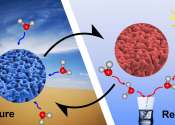American Institute of Physics
The American Institute of Physics (AIP) promotes science, the profession of physics, publishes physics journals, and produces publications for scientific and engineering societies. The AIP is made up of various member societies. Its corporate headquarters are at the American Center for Physics in College Park, Maryland, but the institute also has an office in Melville, New York and Beijing, China.
- Website
- http://www.aip.org/
- Wikipedia
- http://en.wikipedia.org/wiki/American_Institute_of_Physics
Some content from Wikipedia,
licensed under CC BY-SA









